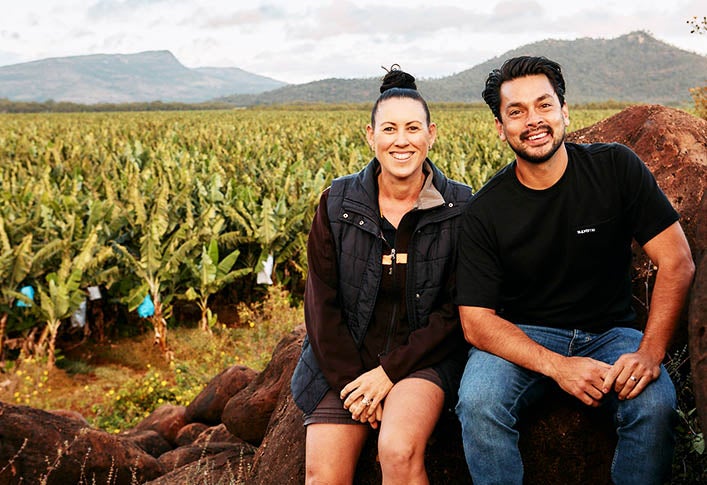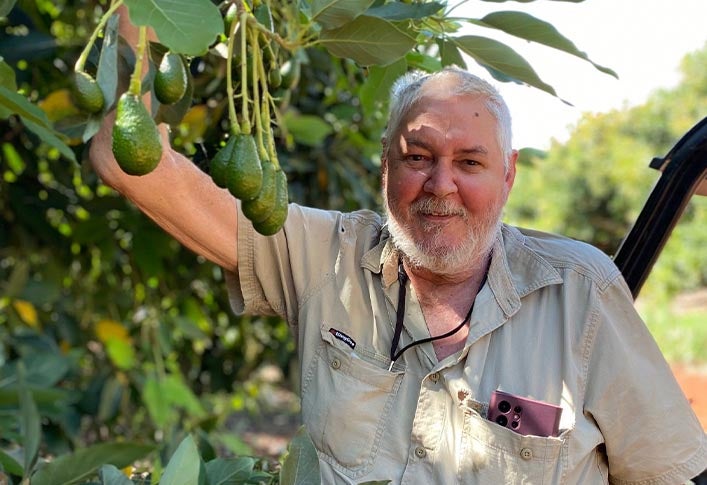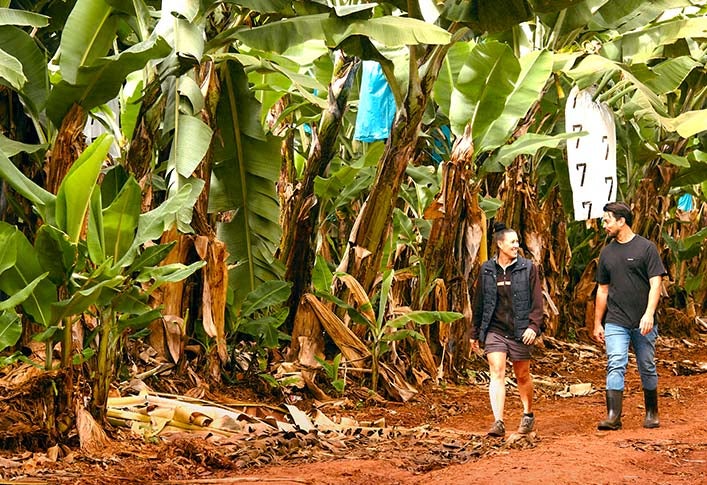Posted by on
08/11/2022
Kimberley Mastin, General Manager Howe Farming, with Louis Tikaram, Farm to Fork Host and Chef
North Queensland’s Howe family believe they’re in Australia’s ‘sweet spot’ when it comes to productivity – and they’ve got the flavoursome produce to prove it.
Having grown what was a humble family farm into one of Australia’s most diverse large scale agribusiness, the family has remained undaunted in its quest to realise opportunity and provide Australian consumers with superior quality bananas, avocados and coffee.
Cotton, sugar cane, peanuts, citrus and lychees are also part of Howe Farming’s enterprise, which now spans over 3,000 hectares of strategically located farms, all within a 20 kilometre radius.
Managing Director and founder, Dennis Howe has inherited every bit of his late parents’, Tom and Yola’s, pioneering spirit. His open mind and appetite to explore opportunity – and pivot when needed – has underpinned the businesses’ enormous growth.
“My parents started their own farm with a soldier’s settlement in the 1950s, growing tobacco, melons and pumpkins. When I returned home from studying civil engineering at university in the mid-70s, we decided to stop growing tobacco and as an alternative, started growing potatoes, peanuts and navy beans.
“By the mid-90’s, it was generally accepted that the Tablelands were too cold to grow bananas, apart from a small Lady Finger grower in the region,” Dennis explains. “However, sugar cane seemed to grow well up here and bananas grow where cane does so we planted nine hectares of Cavendish bananas in ’95.”
“At first we thought it was a tough way to make money until a little storm hit the coast and the price went up - then I decided it wasn’t so bad after all!”
A fruitful opportunity
Dennis pioneered the establishment of the Cavendish variety on the Tablelands – a region now renowned for its quality banana production.
“During our first banana harvest we noticed that the fruit was brighter, larger and sweeter than other Cavendish bananas grown on the coast,” Dennis smiles, “so we called ourselves, ‘Bananas With Altitude’.”
“The beauty of this region, apart from its fertile, red, volcanic soil, is its perfect weather and altitude, at 550 – 600 metres, for growing just about anything – and the reliable irrigation water from Tinaroo Dam,” he says.
Warm, humid conditions are ideal for bananas, and thus, the busiest time for bananas is during the summer months.
“Production slows toward the middle of the year as the weather cools, however, we continue to harvest for 52 weeks of the year.”
Leveraging the farm’s natural capital, the family’s “With Altitude” brands were born, positioning their produce as proudly Australian, and helping share their farming story with consumers.
“When I walk into a supermarket and see a 'Bananas with Altitude’ sticker, I do get a buzz, and feel very proud to be providing Australian communities across the country with fresh, natural bananas, full of flavour and goodness.”
The additional acquisition of three sugar cane properties, grown in effective rotation with peanuts and cotton, ensures the Howes’ well and truly have a number of balls in the air.
Yet such diversity, Dennis admits, is not without its challenges.
“It can work against you – we don’t want to be ‘Jack of all trades, master of none’, which is why we have a very strategic and dedicated team behind the business.”
Smashing conditions for avos
Continually experimenting with various commodities and rotations, Dennis planted a small number of avocado trees back in the 1970s, which he later pulled out due to a lack of market.
“I’m always willing to try new things, but I won’t grow anything unless they are productive and profitable.”
Come the 1990s, and on a quest to secure an alternative market, he revisited avocados when a neighbouring 55-hectare property came up for sale, planted predominantly with the Shepard variety.
The Howes have since planted many more hectares of avocados, some Hass, but mostly their beloved Shepard variety, all supplied to supermarkets nationally through the Howes’ ‘Avocados with Altitude’ brand.
Dennis believes the rich soils of the northern Tablelands – Walkamin and Mareeba – are perfect for growing Shepard avocados.
“They have more of a pear-shape compared to the most common variety, Hass, and a smoother skin which does not darken when ripe but stays green,” Dennis says. “It makes it harder for the unfamiliar consumer to tell when its ripe, but it’s worth it for Shepard’s firmer, buttery-nutty flavour.”
“The Far North Queensland Shepard season kicks off the start of the Australian avocado season in late January until April before the Hass season starts and continues down the east coast and across to WA.”
“While I don’t think we’ll ever see the prices we originally enjoyed due to oversupply, I’m confident prices will find their balance again,” Dennis says.

Dennis Howe, Managing Director Howe Farming
Waking up to Coffee production
The Howe’s also experimented growing coffee in the 1980s, with limited success, however pre-empting a potential banana import glut and avocado market oversupply, they returned to coffee production in 2002.
Today, ‘Coffee With Altitude’ is a cornerstone of the operation, with the family’s Arabica variety coffee plantations grown above 550m altitude – their green beans are sold to roasters Australia wide, who then market the roasted coffee with their own ‘Australian Grown’ brand.
“The beauty of this region is its capacity for diversity, and we’ve never been afraid to change paths if the figures stack up,” Dennis said.
More recently the Howes’ have collaborated with Hunt and Brew, to create Australia’s first Cold Brew Iced Coffee, using our Australian coffee beans.
Last month the product was announced as a winner at the World Beverage Innovation Awards.
“We are proud to supply Hunt and Brew, they’re impressive operators. I’ve tasted their product and think it’s really nice - like drinking a real coffee, not really sweet like other ice coffees.”
Connecting to consumers
With consumers becoming increasingly savvy when sourcing Australian grown produce, Dennis said he was proud to be contributing to the fresh food movement.
To further showcase and promote their paddock to plate journey, the Howes will soon feature on Channel 10s Farm to Fork cooking program, helping educate Australians on where their food comes from.
Dennis said Rabobank’s partnership with Farm to Fork, which regularly features Rabobank clients sharing stories of their produce, how it’s grown and incorporated into recipes, was an excellent initiative.
“We had Farm to Fork host Louis Tikaram, of Brisbane’s Stanley Restaurant, come and film on-farm for a day, which was lots of fun,” Dennis says. “It is such a genuine and engaging chance to show people, particularly in urban areas, how their food is produced.”
“We are always grateful for the opportunities to showcase our produce, and as Rabobank clients it’s heartening to know that our bank shares these values and is proactive in helping promote Aussie farmers.”
Farming for the future
Today Howe Farming Group is the largest private employer on the Tablelands, employing over 450 staff including seasonal workers.
Ensuring Workplace Health and Safety remains a core responsibility, as does the implementation of strict biosecurity measures.
The family is also staunchly committed to continuously improve environmental outcomes across its operation. Even staff transport is considered in the operation’s policy, with transport supplied for workers to minimise emissions and biosecurity risks.
“Getting our staff safely to work is so important, we can reduce emissions, and minimise the number of potential soil-borne diseases introduced from cars driven in from who-knows-where.”
“We’re constantly looking at ways of reducing waste. We’re using solar energy wherever feasible and upgrading our infrastructure and equipment to be more efficient with water and energy.”
“We’ve invested in infrastructure to capture our waste chemicals, as well as plastics recycling technology which we’re excited should be up and running in the not-to-distant future,” Dennis said.
To watch Farm to Fork episodes with Howe Farming tune into their banana episode on Thursday 10 November and Coffee Bean episode Friday 16 December.
Farm to Fork airs Monday to Friday on Channel 10 from 4pm, launching on 7 November and you can catch up on episodes and recipes after their air date any time on 10play.com.au

Kimberley Mastin, General Manager Howe Farming, with Louis Tikaram, Farm to Fork Host and Chef
